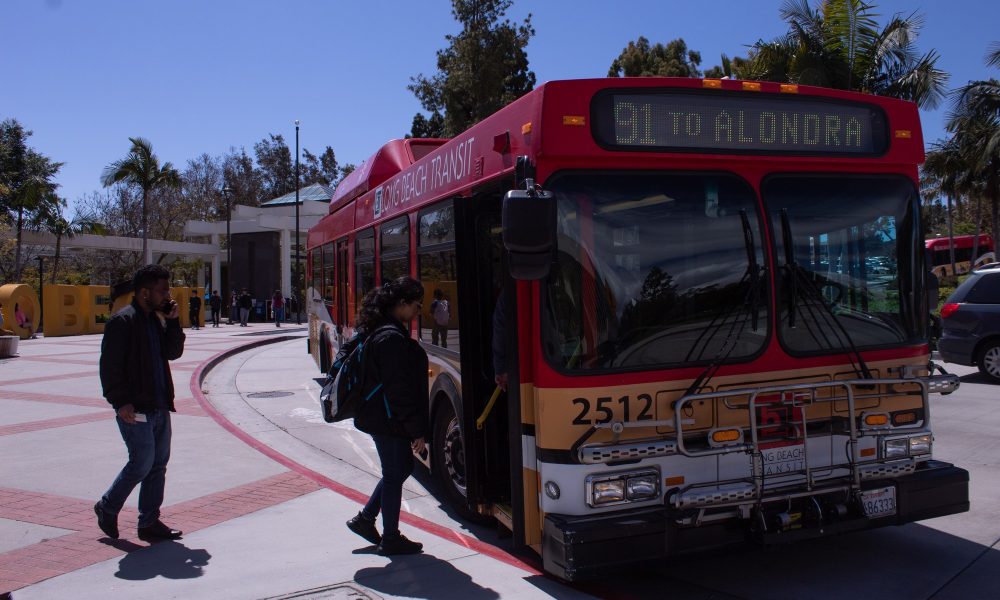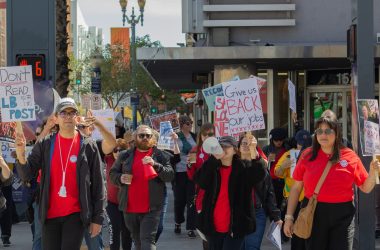As a commuter school, Long Beach State students come from many different cities, but those riding public transportation face more challenges.
Depending on the city, public transportation students will need to purchase specific bus passes to get from their town to school, as some only work with certain transit agencies.
CSULB offers its students the “Go Beach! Discounted Bus Pass,” a discounted bus pass that allows them unlimited access to Long Beach Transit buses.
This pass costs $40 for a 30-day pass and $100 for a 150-day pass.
Because it only works with LBT, it is only beneficial to students who already live relatively near campus.
Options for long-distance commuters are limited. These students are spending more money on bus passes that will only get them part of the way to campus.
Students who live farther away, where LBT is not the primary transit agency, can purchase a College/Vocational 30-day pass. Dave Sotero, communications director for Metro, said this pass costs $43.
This pass works with Metro buses and trains and can be used with other agencies, but with a transfer charge of varying prices depending on the agency.
CSULB students pay almost $500 annually for the pass, whereas many community colleges benefit from free bus passes.
Elizabeth Miller, dean of Student Services at Cerritos College, said her college offers students a free bus pass as long as they pay their student fees.
This is Metro’s “GoPass,” a program started in 2021 that offers K-12 and community college students a free bus pass that allows them access to several public transportation agencies, including the Metro, Long Beach Transit and many others in and around LA County.
CSULB was excluded from the program because it was unavailable to four-year institutions.
A spokesperson for LBT said the program results from a partnership between Los Angeles County and Metro.
A press release by Metro in September 2022 cited rising gas prices and living expenses as the reasons why driving to campus is unfeasible for many students.
“Before the launch of Metro’s GoPass program, LACCD students were paying $160 or more per semester for a Metro U-Pass, which was unaffordable to many community college students,” reads the press release on Metro’s website. “The advent of truly free public transit has eliminated one of the major pain points faced by LACCD students and dramatically increased equity on campus and made it easier for students to return to in-person instruction this fall.”
“The Los Angeles County Board of Supervisors approved one-time funding in 2020 for a free transportation program for students,” said the spokesperson.
Miller said the Associated Students of Cerritos College is responsible for acquiring the “Go Pass.” The ASCC voted to increase the student activity fee, previously $10, by nine dollars, a fee which had not increased in more than 30 years.
“Our students knew that was the case and still thought it was really important to offer,” Miller said.
Previously, CSULB offered the U-Pass, which allowed students unlimited rides on Metro and LBT buses.
Chad Keller, CSULB public affairs and communications specialist for parking and operations said Metro’s U-Pass was available to students in 2017 but only lasted a few years. It cost $150 but was discontinued due to a lack of funding.
The Daily Forty-Niner reported that Parking and Transportation Services was paying more than $1 million for the program when it was discontinued.
Keller said reintegrating the pass would come down to negotiations with Metro. Its price would also depend on how students would use it: whether it would be an unlimited pass or be charged every time it was used.
Metro’s U-Pass website has a link for students to inquire about bringing the program to their school and a FAQ form for administrators. The form is short and asks students their general information like name, units enrolled in as well as method of transportation, and why they think the program would benefit their school.
Filling out the survey is a simple way for students can let Metro know they want the program at CSULB again.
Keller said the reinstitution of the program at CSULB would ultimately come down to funding.
The “U-Pass” could return and ease the wallets of public transportation students if CSULB were to increase its fees like Cerritos College or reopen negotiations with Metro.




